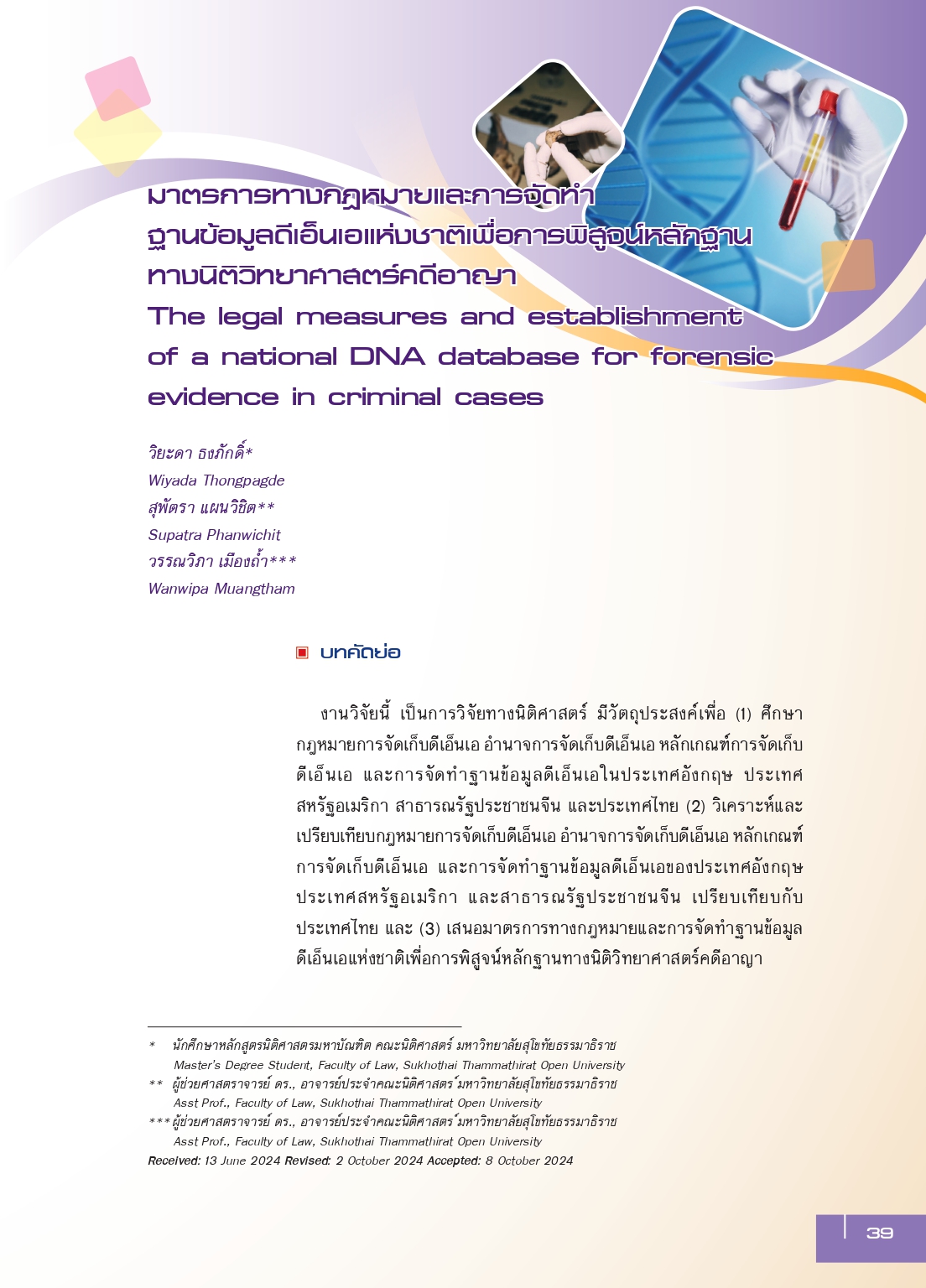มาตรการทางกฎหมายและการจัดทำฐานข้อมูลดีเอ็นเอแห่งชาติเพื่อการพิสูจน์หลักฐานทางนิติวิทยาศาสตร์คดีอาญา
Main Article Content
บทคัดย่อ
งานวิจัยนี้ เป็นการวิจัยทางนิติศาสตร์ มีวัตถุประสงค์เพื่อ (1) ศึกษากฎหมายการจัดเก็บดีเอ็นเอ อำนาจการจัดเก็บดีเอ็นเอ หลักเกณฑ์การจัดเก็บดีเอ็นเอ และการจัดทำฐานข้อมูลดีเอ็นเอในประเทศอังกฤษ ประเทศสหรัฐอเมริกา สาธารณรัฐประชาชนจีน และประเทศไทย (2) วิเคราะห์และเปรียบเทียบกฎหมายการจัดเก็บดีเอ็นเอ อำนาจการจัดเก็บดีเอ็นเอ หลักเกณฑ์การจัดเก็บดีเอ็นเอ และการจัดทำฐานข้อมูลดีเอ็นเอของประเทศอังกฤษ ประเทศสหรัฐอเมริกา และสาธารณรัฐประชาชนจีน เปรียบเทียบกับประเทศไทย และ (3) เสนอมาตรการทางกฎหมายและการจัดทำฐานข้อมูลดีเอ็นเอแห่งชาติเพื่อการพิสูจน์หลักฐานทางนิติวิทยาศาสตร์คดีอาญา
ผลการวิจัย (1) การศึกษากฎหมายการจัดเก็บดีเอ็นเอ อำนาจการจัดเก็บดีเอ็นเอ หลักเกณฑ์การจัดเก็บดีเอ็นเอ และการจัดทำฐานข้อมูลดีเอ็นเอ พบว่า ประเทศอังกฤษบัญญัติกฎหมายเพื่อให้อำนาจจัดเก็บดีเอ็นเอและกำหนดหลักเกณฑ์จำแนกตามฐานความผิดและวิธีการจัดเก็บตามหลักสิทธิมนุษยชน สำหรับประเทศสหรัฐอเมริกาให้อำนาจแต่ละมลรัฐตรากฎหมายขึ้นเอง โดยมีกฎหมายหลักบัญญัติรองรับการสืบค้นข้อมูลอย่างเป็นระบบ ในสาธารณรัฐประชาชนจีนจัดเก็บดีเอ็นเอโดยปราศจากกฎหมายแต่อาศัยอำนาจสั่งการจากรัฐ ส่วนประเทศไทยจัดเก็บดีเอ็นเอตามหลักความยินยอมเท่านั้น (2) การวิเคราะห์และเปรียบเทียบกฎหมายการจัดเก็บดีเอ็นเอ อำนาจการจัดเก็บดีเอ็นเอ หลักเกณฑ์การจัดเก็บดีเอ็นเอ และการจัดทำฐานข้อมูลดีเอ็นเอพบว่า ประเทศอังกฤษได้มีการปรับเปลี่ยนกฎหมายให้บังคับจัดเก็บดีเอ็นเอได้เพื่อประโยชน์ของรัฐในการรักษาไว้ซึ่งความมั่นคงปลอดภัยของประเทศ ประเทศสหรัฐอเมริกามีกฎหมายและหน่วยงานเพื่อการเชื่อมโยงข้อมูล 3 ระดับ คือ ระดับท้องถิ่น ระดับมลรัฐ และระดับชาติ ส่วนสาธารณรัฐประชาชนจีนสามารถบังคับจัดเก็บดีเอ็นเอจากประชาชนตามนโยบายรัฐโดยคำนึงถึงเป้าหมายในการจัดเก็บเป็นสำคัญ ขณะที่ประเทศไทยมีรัฐธรรมนูญแห่งราชอาณาจักรไทยเป็นกฎหมายสูงสุดที่สนับสนุนให้นำนิติวิทยาศาสตร์มาใช้ในกระบวนการยุติธรรมแต่ยังไม่สามารถนำมาใช้อย่างเท่าเทียมกันทุกคดี และ (3) ข้อเสนอมาตรการทางกฎหมายและการจัดทำฐานข้อมูลดีเอ็นเอแห่งชาติเพื่อการพิสูจน์หลักฐานทางนิติวิทยาศาสตร์คดีอาญามี 3 ประการ คือ (1) ด้านการให้อำนาจจัดเก็บดีเอ็นเอนั้น ควรบัญญัติกฎหมายเพื่อคุ้มครองสิทธิเสรีภาพของบุคคลเทียบเท่ากับประโยชน์ของรัฐในการรักษาไว้ซึ่งความมั่นคงปลอดภัยของประเทศและการบังคับใช้กฎหมายได้อย่างมีประสิทธิภาพ (2) ด้านหลักเกณฑ์การจัดเก็บดีเอ็นเอนั้น ควรขยายหลักเกณฑ์การจัดเก็บดีเอ็นเอจากเนื้อตัวร่างกายให้มีความยืดหยุ่น หากมองว่าการจัดเก็บดีเอ็นเอจากเนื้อตัวร่างกายของบุคคลเพียงเล็กน้อยกระทบกับสิทธิเสรีภาพของบุคคลมากกว่าประโยชน์ของรัฐ การกำหนดหลักเกณฑ์การจัดเก็บดีเอ็นเอย่อมมีข้อจำกัดที่เป็นอุปสรรคต่อการจัดทำฐานข้อมูลดีเอ็นเอเพื่อการพิสูจน์หลักฐานทางนิติวิทยาศาสตร์คดีอาญา และ (3) ด้านการจัดทำฐานข้อมูลดีเอ็นเอแห่งชาตินั้น ควรบัญญัติกฎหมายเพื่อรองรับการสืบค้นและเชื่อมโยงข้อมูลอย่างเป็นระบบ
Article Details

อนุญาตภายใต้เงื่อนไข Creative Commons Attribution-NonCommercial-NoDerivatives 4.0 International License.
ต้นฉบับที่ได้รับการตีพิมพ์ในวารสาร เป็นลิขสิทธิ์ของวารสารกระบวนการยุติธรรม แต่ความคิดเห็นที่ปรากฏในเนื้อหาของบทความในวารสารกระบวนการยุติธรรม ถือเป็นความรับผิดชอบของผู้เขียนแต่เพียงผู้เดียว
เอกสารอ้างอิง
Criminal Records Division, Royal Thai Police. (2022). Agency structure. https://criminal.police.go.th/structuralunit.php
Ploypailin Bunthawatchak. (2015). Collection and use of offender DNA in the United States: A case study for Thailand. Ramkhamhaeng Journal Forensic Science Edition, 4(2), 17-31.
Ratchanee Taeng-on. (2016).Legal measures for developing the national DNA database and privacy rights: guidelines for enacting laws for enforcement in Thailand. Journal of Politics, Administration, and Law, 9(2),579-611.
Ratchanee Taeng-on. (2019). Criminal justice process and national DNA database: experiences of EU member countries. Journal of Politics, Administration and Law, 8(1),459-476.
Riccardo Sabatini. (2022,February). How to read the genome and build a human being. TDC.
Salisa Phrommakrit. (2022). Storing DNA substances for import into a database: Studying human rights issues. Academic Journal of Criminology and Forensic Science, 8(1), 38.
Sompong Techasomboon. (2022). Forensic science and the promotion of justice. http://www.dsdw2016.dsdw.go.th/doc_pr/ndc_2560-2561
Tassanee Kamkhaman. (2022). Protection of personal rights and freedoms: Study of the case of DNA evidence storage. TDC. https://tdc.thailis.or.th/tdc.
Thai PBS. (2022). Unraveling the Koh Tao Case. https://www.youtube.com/watch?v=g9UMdDBreWQ&t=2340s.
Wariya Thongpagde. (2022). Development of forensic evidence systems in criminal cases, criminal justice [Doctor of Philosophy
Thesis] Forensic Science Department Faculty of Science Silpakorn University.
Wipu Wimonset. (2020). Genetic Material Database and the necessity of creating a genetic material database in Thailand [Doctor of Philosophy Thesis]. Forensic Science Department Faculty of Science Silpakorn University.
WR Webster Jr. (2000). DNA database statutes & privacy in the information age. Health Matrix: The Journal of Law Medicine, 10(1),119.


